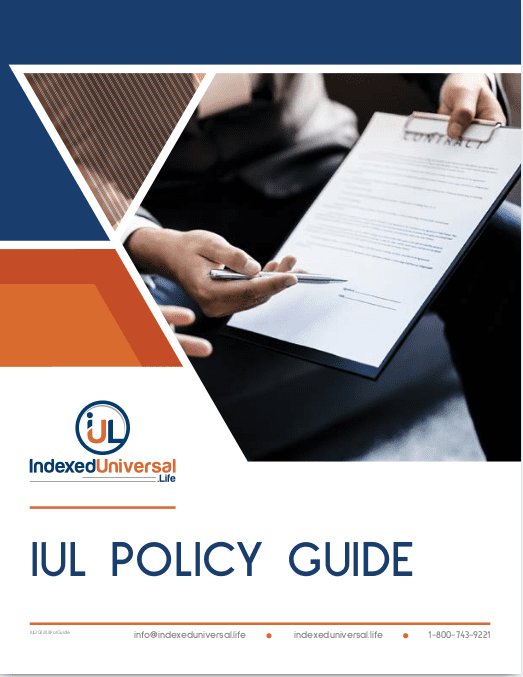All Categories
Featured
Table of Contents
For making a minimal amount of the index's growth, the IUL will certainly never ever receive less than 0 percent rate of interest. Even if the S&P 500 decreases 20 percent from one year to the following, your IUL will not shed any type of money worth as a result of the marketplace's losses.

Discuss having your cake and consuming it too! Envision the passion compounding on an item with that sort of power. Offered all of this information, isn't it imaginable that indexed global life is an item that would enable Americans to buy term and invest the remainder? It would certainly be hard to refute the reasoning, would not it? Now, don't obtain me wrong.
A real financial investment is a safeties item that goes through market losses. You are never based on market losses with IUL simply because you are never ever subject to market gains either. With IUL, you are not purchased the marketplace, yet merely gaining passion based upon the performance of the market.
Returns can expand as long as you continue to make repayments or maintain an equilibrium.
What Is Indexed Whole Life Insurance
Unlike universal life insurance policy, indexed universal life insurance's cash value gains rate of interest based on the performance of indexed securities market and bonds, such as S&P and Nasdaq. Bear in mind that it isn't directly bought the supply market. Mark Williams, CEO of Brokers International, discusses an indexed global life policy resembles an indexed annuity that seems like universal life.

Because of these attributes, irreversible life insurance policy can work as an investment and wealth-building tool. Universal life insurance policy was produced in the 1980s when rates of interest were high. Like various other sorts of permanent life insurance, this plan has a money worth. Universal life's cash money worth earns rate of interest based on existing money market prices, but passion rates change with the market.
Indexed universal life plans offer a minimum guaranteed rates of interest, also known as a rate of interest attributing flooring, which lessens market losses. As an example, claim your cash value loses 8%. Many firms provide a flooring of 0%, suggesting you will not lose 8% of your investment in this case (top iul companies). Be mindful that your cash money value can decrease despite having a floor as a result of costs and other expenses.
Maximum Funded Indexed Universal Life
It's likewise best for those happy to think additional threat for greater returns. A IUL is a permanent life insurance policy that obtains from the residential properties of an universal life insurance policy plan. Like global life, it enables versatility in your survivor benefit and premium payments. Unlike universal life, your cash money worth grows based on the efficiency of market indexes such as the S&P 500 or Nasdaq.
Her work has been published in AARP, CNN Emphasized, Forbes, Ton Of Money, PolicyGenius, and U.S. News & World Record. ExperienceAlani has evaluated life insurance and pet insurer and has actually composed many explainers on travel insurance policy, credit rating, financial debt, and home insurance policy. She is enthusiastic concerning debunking the intricacies of insurance coverage and other individual finance topics to ensure that viewers have the details they require to make the most effective money decisions.
Paying only the Age 90 No-Lapse Premiums will certainly assure the fatality advantage to the insured's achieved age 90 yet will certainly not ensure cash value build-up. If your client discontinues paying the no-lapse assurance premiums, the no-lapse function will terminate before the assured period. If this takes place, extra premiums in an amount equal to the shortage can be paid to bring the no-lapse attribute back effective.
I recently had a life insurance coverage salesperson turn up in the comments string of a blog post I released years ago concerning not blending insurance and investing. He believed Indexed Universal Life Insurance Coverage (IUL) was the very best point given that cut bread. In assistance of his placement, he posted a web link to an article composed in 2012 by Insurance Representative Allen Koreis in 2012, qualified "16 Reasons Accountants Prefer Indexed Universal Life Insurance Coverage" [link no more available]
Life Insurance Stock Index
First a brief description of Indexed Universal Life Insurance. The destination of IUL is apparent. The premise is that you (practically) obtain the returns of the equity market, with no threat of shedding money. Currently, before you diminish your chair poking fun at the absurdity of that declaration, you require to recognize they make an extremely convincing argument, at least until you look at the information and understand you do not get anywhere near the returns of the equity market, and you're paying much too much for the guarantees you're obtaining.

If the market drops, you obtain the assured return, normally something in between 0 and 3%. Naturally, because it's an insurance plan, there are also the common costs of insurance coverage, compensations, and abandonment costs to pay. The details, and the reasons that returns are so awful when mixing insurance policy and investing in this particular way, boil down to primarily 3 points: They only pay you for the return of the index, and not the rewards.
Back End Load Universal Life
Your maximum return is capped. If you cap is 10%, and the return of the S&P 500 index fund is 30% (like last year), you obtain 10%, not 30%. Some policies just offer a particular percent of the modification in the index, state 80%. If the Index Fund goes up 12%, and 2% of that is dividends, the modification in the index is 10%.
Include all these effects with each other, and you'll locate that long-term returns on index universal life are pretty darn near to those for entire life insurance, favorable, however reduced. Yes, these policies assure that the cash worth (not the cash that mosts likely to the prices of insurance coverage, certainly) will certainly not lose money, yet there is no assurance it will keep up with inflation, much less expand at the rate you require it to grow at in order to offer your retirement.
Koreis's 16 factors: An indexed global life plan account worth can never ever lose cash due to a down market. Indexed global life insurance warranties your account value, securing in gains from each year, called an annual reset.
IUL account worths grow tax-deferred like a certified strategy (IRA and 401(k)); common funds do not unless they are held within a qualified strategy. Just put, this suggests that your account value benefits from triple compounding: You earn interest on your principal, you gain interest on your interest and you earn interest on the money you would or else have paid in tax obligations on the rate of interest.
Guaranteed Universal Life Insurance For Seniors
Although certified plans are a much better selection than non-qualified strategies, they still have concerns absent with an IUL. Investment choices are generally restricted to common funds where your account value goes through wild volatility from exposure to market danger. There is a large distinction in between a tax-deferred pension and an IUL, however Mr.
You purchase one with pre-tax bucks, saving money on this year's tax obligation expense at your minimal tax price (and will usually have the ability to withdraw your cash at a reduced efficient price later) while you spend in the various other with after-tax dollars and will be required to pay interest to obtain your very own cash if you do not wish to surrender the policy.
After that he tosses in the timeless IUL sales person scare strategy of "wild volatility." If you despise volatility, there are far better methods to lower it than by buying an IUL, like diversification, bonds or low-beta stocks. There are no limitations on the amount that may be contributed each year to an IUL.

Why would certainly the government put limits on just how much you can place into retired life accounts? Possibly, just possibly, it's due to the fact that they're such a wonderful offer that the federal government does not want you to conserve too much on taxes.
Latest Posts
What Is The Difference Between Universal And Whole Life Insurance
Iul Annuity
Universal Guaranty Investment Company